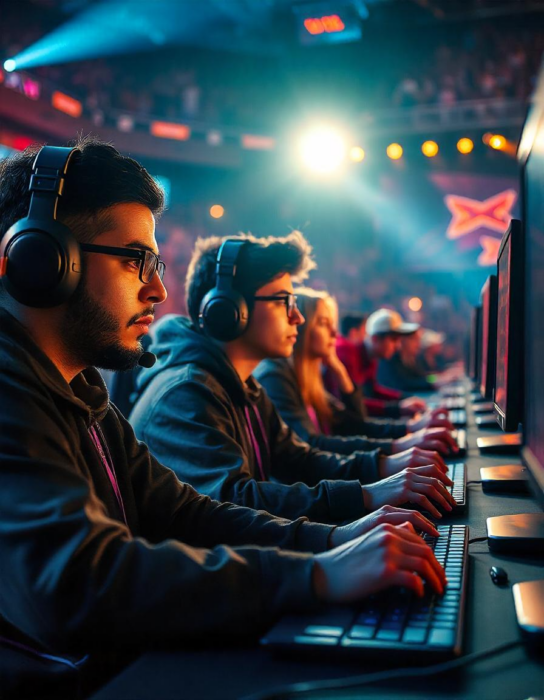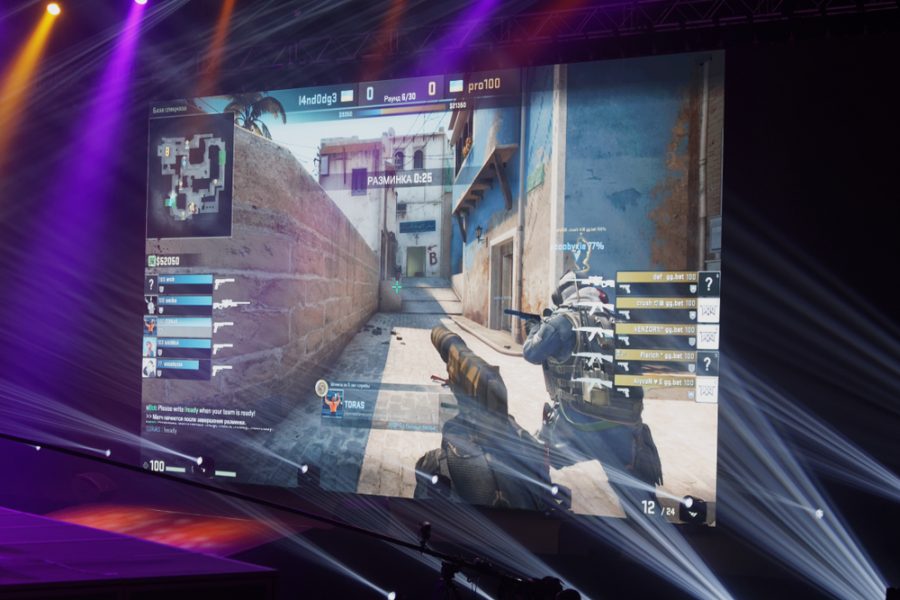Gaming News
5 Reasons Why CS:GO Is The GREATEST Esport


When 727,000 people tuned in to watch the grand final between G2 Esports and ENCE at IEM Cologne, the event became the most-watched non-Major tournament in the history of Counter-Strike: Global Offensive (CS:GO). This latest record marked a fitting finale for the last gig in the game’s competitive history before its pro players and playerbase move over to its upcoming successor, CS2. In celebration of CS:GO’s final act on the stage, let’s take a look at the reasons why CS:GO has established itself as the world’s greatest Esport.
It’s Simplicity
Whenever you’re trying to make something appealing to a mass-market of consumers, it’s vital that your product doesn’t scare off any newcomers. Games like League of Legends or Dota 2 are stalwarts in the Esports space, but it’s safe to say these Massive Online Battle Arena (MOBA) games aren’t nearly as accessible to those who haven’t played them before as CS:GO is. Thanks to the longstanding popularity of games like Call of Duty or Fortnite, almost every gamer has an understanding of what a first-person shooter (FPS) looks and plays like, with most casuals being able to call upon real-world experience in games like paintballing to work out how their game modes work.
The same is the case for CS:GO. Two teams of five, one acting as the offensive the other as defence, attempting to kill eachother or successfully detonate/defuse a bomb from one of two bombsites on a map. Even if you have never seen a CS:GO match before, it doesn’t take more than a handful of rounds to be able to dive in and understand what’s going on.
It’s Complexity
The perfect Esport is the one that can appeal to a large playerbase with an easy entry level, but hold them for hundreds of hours with a stacked skill ceiling. The best Esports games have been dominating the industry for over a decade now, showcasing their impressive range of strategies and competitive metas that never allow even pro players to feel like they have ever ‘cracked’ the game.
And whilst CS:GO might be an easy game to grasp, it is incredibly difficult to ever claim that it has been conquered. Everything from a shifting map pool, the volatility of the economy system that can swing with every kill to the natural chaos that can arise from the quality of communication in the server, CS:GO is a game that always manages to throw something new in with every event.
Global Audience
It’s safe to say that whilst Esports is a giant industry, most of its leading titles are very concentrated in certain countries or regions. The majority of Overwatch professional players are Korean, LCK and LPL teams have won 10 League of Legends World Championships, whilst France still dominate the top tier of competitive Rocket League.
CS:GO, on the other hand, is perhaps the most global Esport on the market. Teams from Europe, North America and South America have all won Majors in the past, and international lineups have become the norm for most orgs. One look at the Esports markets at Unikrn.com will showcase the vibrancy in countries and nationalities competing at CS:GO events. This diversity not only makes for a more interesting competitive scene, but also allows the game to be marketed to hundreds of thousands more fans around the globe.
The Gameplay
We touched on it earlier, but the real hero of CS:GO’s success is its gameplay formula. MOBA titles are the masters of strategy, communication and long-term planning, whilst side-scrolling fighter games have that fast-paced adrenaline-pumping experience, but no title is able to blend all of these facets together quite like Valve’s FPS. Winning a game of CS:GO requires patience, resilience, strategy, concentration, focus and the ability to think five or six rounds in advance. However, it also allows for instantaneous, split-second moves that demonstrate an otherworldly reaction times to get a crowd’s pulses racing. It is this winning formula that has made the game such an enduring part of the industry, one that millions of people always make time to tune in to.
The Personalities
CS:GO has one of the most well-developed and stacked competitive calendars in the industry. Teams are constantly on the road to packed out venues for the latest S-Tier event, with prize pools regularly surpassing the $1 million mark. Not only does this make the game one of the most potentially lucrative for a budding pro or organisation, but it means the stakes are amped up each time two rivals go up against one another in the server. Venues such as the LANXESS in Cologne or Spodek Arena in Katowice have become cathedrals for the entire Esports industry, being kitted out annually with jaw-dropping production values on everything from the cast, commentators, make-up, sound and lighting, refreshments and merchandise to the in-studio entertainment between matches.
All of this magic going on behind the game allows the world’s best players to strut their stuff and write unforgettable storylines whenever they step onto the stage. CS:GO pros have come to embrace their new rock-and-roll superstar status in a way that is still alien to most other players in other games. This added dose of stardom makes CS:GO just as much a show as it is a competitive sporting spectacle.
Gaming News
What Are Case Battles in CS:GO? A Beginner’s Guide to the Skin Showdown

Case battles have emerged as one of the most popular game modes in modern CS:GO gambling. It’s a game mode filled with thrill, unpredictability, and a player vs. player aspect. If you’re new to case battles and want to dive right in, here’s what you need to know.
What are Case Battles in CS:GO?
Case battles bring the typical case opening game mode to another level. Instead of just opening cases, players enter a “battle” against others to see who can obtain the most valuable skin from the round.
Players will unbox the same lineup of cases and pull varying rewards. At the end of the round, the total value pulled from each player will be tallied up, and the person with the highest value will scoop all the skins in the pot.
Case battles are a thrilling mix of gambling, luck, and competition, making it one of the most exciting game modes in CS:GO gambling.
How Does a Typical Case Battle Work?
A typical case battle will go through the following procedures:
Case Selection
To create a battle, players must first select the lineup of cases they want to open. Case opening websites offer different cases containing a variety of skins that can range in rarity and value. Of course, the prices for cases will also vary.
Players can include as many cases as they’d like while also mixing in the case types to create more variety.
Battle Type Selection
After selecting the lineup of cases, the next step is to select the type of battle. There are various case battle game modes, all adding twists and interesting mechanics to keep the battles spicy. The different game modes will be discussed later in the article.
Battle Time
After the cases and battle types have been selected, the battle will be posted for others to join. Once players have joined, the battle will commence.
Players will open the same cases in real time. The skin drop from each case is revealed, with the prices of the skins determining the outcome at the end.
Winning Criteria
The winner of the case battle is typically the player with the highest total value from their pulls once all the cases have been opened.
The victor keeps not only the skins they unboxed but also all the skins pulled by other players, essentially claiming the entire pot.
Case Battle Game Modes
If you want to battle against other players, most websites offer different game modes to keep things interesting:
Original Mode
In the Original case battle mode, players will unbox the same lineup of cases, and the total value of their pulls will be tallied up. In the end, the player with the highest value will win the battle and scoop all the skins.
Crazy Mode
Crazy Mode flips the entire script of the Original Mode. Instead of having the player with the highest value win, Crazy Mode crows the player with the lowest value as the victor. This means you’re praying to pull cheap while hoping your opponents hit the jackpot.
Shared Battle
In a Shared Battle, all players work together to get the most value. Players will collectively open cases, but the skins are shared between participants. Instead of competing individually, the winnings from each player are pooled together and divided among all the participants. It’s a great way to spread risk.
Team Mode
In Team Mode, players are divided into teams, ranging from 2v2, 3v3, to 4v4. The battle is won by the team whose collective skins have the highest value at the end of the battle. It’s a thrilling way to play case battles with friends.
Explore more browser games posts here: https://www.unigamesity.com/category/browser-games/
Gaming News
Unique D&D Dice Set: Making A More Dynamic And Engaging Game

D&D is the storyteller of the game. It brings suspense and triumph to the game as the heart of the game. You will know what the D&D dice is used for when you keep reading here. Do not worry if you do not know how it is used as you will learn here how important these dice are in the D&D game.
The players use D&D dice to determine the results of actions taken by the characters. Dungeon and Dragon has different types of dice with a specific purpose in the game. Runic Dice helps you unlock the arcane power when roaming in dungeons and slaying dragons, which can also weave spells.
Runic Die
The Runic Die is especially popular among roleplayers who love the touch of mysticism. These are mystical relics, more than trinkets steeped in the ancient power. Runic die in Dungeons and Dragons is more than ordinary dice rolled at the table. These are magical items in carved stones infused with magical runes, glowing with arcane energy.
The dice appear in different forms according to the campaign setting. They serve a similar purpose, such as:
- grants players a limited-use magical boon
- influences fate in quite powerful ways
The dice are treated as magical items of consumables with limited charges. They are flavored to fit any theme, from infernal glyphs to Nordic runes, depending on what world your Dungeon master has built.
How do these dice work in gameplay?
There is no official standardized version of runic die in D&D rulebooks, but more homebrew creators introduced runic into their settings. The common mechanic in DnD involves the player rolling a special die, usually the following:
- D6
- D8
- D12
These dice are used at a specific time like before or after various actions, such as:
- Attack
- Ability to check
- Saving throw
The result offers a temporary bonus triggering a minor magical effect or calling a stored spell.
Here are the examples:
- Runic Die of Fate. The dice is used once a day, it saves a throw or rerolls a failed ability to check.
- Runic Die of Frost. Add the outcome after rolling the D6 dice as a cold damage to the weapon attack.
- Runic Die of Binding. Roll a die to attempt to restrain a magical creature in 30 ft for one round.
Some Dungeon Masters include dice as a gift from ancient civilizations or a reward for solving puzzles.
The dream of a role-player
Runic die is not only mechanically interesting but has a story-rich potential. The player’s character may be a rune-carver from northern tribes believing the dice hold the ancestors’ wisdom. Or, your role as a player is a warlock whose patron speaks through the runes. The dice give players a tactile, mystical tool in weaving their arc and backstory.
Dungeon Master has a field day with them. The campaign arc revolved around collecting the different Runic die, each tied with the following:
- element
- plane
deity
Conclusion
A Runic die is a brilliant example of the simplicity of how mechanics blossom into something immersive and thematic. The duce can be used as a central part or one-time magical effect of your character’s identity. It can add a touch and flavor of arcane to any D&D session. The next time you deal with the ruins of a forgotten kingdom, you can keep your eyes peeled.
You may never know when you stumble across the tiny cube of stone that hums with its hidden power. The Runic Die in D&D can enhance the player’s gaming experience by adding this thematic appeal. These dice feature the runic symbols that represent specific outcomes or enhance the whole thematic immersion of the game.
Gaming News
Harmonicode Gaming: Revolutionizing Performance and Player Experience

The gaming industry is in a constant state of evolution, driven by technological advancements and the ever-growing expectations of players. Among the latest innovations making waves is Harmonicode gaming, a concept that promises to redefine how games are developed and experienced. By focusing on the harmony between technical coding, creative design, and player satisfaction, Harmonicode gaming is setting a new standard for the industry. This article delves into what Harmonicode gaming is, how it’s transforming game development, and why it’s generating excitement among gamers and developers alike.
Defining Harmonicode Gaming: A New Paradigm

At its core, Harmonicode gaming is a development philosophy that emphasizes the seamless integration of efficient coding and creative design. Unlike traditional approaches, which often treat technical and artistic elements as separate entities, Harmonicode gaming seeks to unite them into a cohesive whole. The goal is to create games that are not only visually stunning but also technically robust, offering players a smooth and immersive experience.
This approach prioritizes clean, optimized code that minimizes redundancy and maximizes functionality. By doing so, developers can achieve faster load times, smoother gameplay, and enhanced visual fidelity. In an era where players demand high-quality graphics and seamless performance, Harmonicode gaming stands out as a solution that bridges the gap between creativity and technology.
Reshaping Game Development: A Developer’s Perspective

For developers, Harmonicode gaming represents a significant shift in how games are created. Traditional game development often grapples with challenges such as poor optimization, bugs, and performance bottlenecks. These issues can lead to delays, increased costs, and frustrated players. Harmonicode gaming addresses these pain points by encouraging streamlined coding practices that work hand-in-hand with creative elements.
By adopting this methodology, developers can reduce errors during the coding process and ensure that every aspect of the game—from character animations to level design—functions harmoniously. This not only improves the overall quality of the game but also shortens development cycles, allowing studios to bring their visions to life more efficiently. For indie developers and AAA studios alike, Harmonicode gaming offers a pathway to creating games that are both technically impressive and artistically captivating.
The Power of Efficiency: Coding Meets Creativity
Efficiency lies at the heart of Harmonicode gaming. One of the biggest challenges in game development is optimizing games for various platforms, from PCs and consoles to mobile devices. Harmonicode gaming tackles this issue by focusing on writing code that is both clean and efficient. This approach minimizes redundancy and ensures that games run smoothly across different hardware configurations.
For players, the benefits are clear: smoother gameplay, fewer bugs, and faster updates. By prioritizing efficiency, developers can create games that not only look amazing but also perform exceptionally well. This harmony between technical and creative elements fosters an environment where innovation thrives, resulting in games that push the boundaries of what’s possible.
Why Players Are Embracing Harmonicode Gaming

Harmonicode gaming is gaining traction among players for several reasons. First and foremost, it promises a better gaming experience. By optimizing performance and reducing technical glitches, Harmonicode gaming ensures that players can fully immerse themselves in the game world without interruptions. Whether it’s a fast-paced action game or a story-driven RPG, players can expect a seamless experience that keeps them engaged.
Another key factor is the focus on user-centric design. Harmonicode gaming encourages developers to pay close attention to what players want, whether it’s dynamic storylines, customizable controls, or adaptive difficulty levels. This player-first approach ensures that games cater to a wide range of preferences, making them more accessible and enjoyable for everyone.
The Road Ahead: Harmonicode Gaming’s Future Potential
While Harmonicode gaming is still in its early stages, its potential is undeniable. As more developers and studios embrace this approach, we could see a wave of games that set new benchmarks for quality and innovation. From indie titles to blockbuster AAA games, Harmonicode gaming has the potential to become a standard practice in the industry.
Looking ahead, emerging technologies like artificial intelligence (AI), machine learning, and cloud gaming could further enhance the possibilities of Harmonicode gaming. These advancements could enable developers to create even more immersive and adaptive experiences, offering players a unique journey every time they play. As the gaming industry continues to evolve, Harmonicode gaming is poised to play a pivotal role in shaping its future.
Collaboration: The Heart of Harmonicode Gaming
One of the key principles of Harmonicode gaming is collaboration. For this approach to succeed, developers, designers, and writers must work closely together to ensure that every element of the game aligns perfectly. This collaborative spirit fosters innovation and allows teams to push the boundaries of what’s possible in gaming.
By breaking down silos and encouraging open communication, Harmonicode gaming creates an environment where creativity and technical expertise can thrive. This synergy between different disciplines is what makes Harmonicode gaming a revolutionary concept, paving the way for games that are not only technically impressive but also deeply engaging.
Overcoming Obstacles: Challenges in Harmonicode Gaming
Despite its many advantages, Harmonicode gaming is not without its challenges. One of the primary hurdles is the learning curve for developers. Adopting this approach requires a shift in mindset, as well as a commitment to learning new tools and techniques. For larger studios with complex projects, maintaining harmony between various departments can also be a significant challenge.
However, these obstacles are not insurmountable. With proper training, tools, and processes, developers can overcome these challenges and reap the benefits of Harmonicode gaming. As the industry continues to embrace this approach, we can expect to see more games that deliver exceptional performance and player satisfaction.
Conclusion: A Harmonious Future for Gaming
Harmonicode gaming represents a bold step forward for the gaming industry. By focusing on the harmony between code, creativity, and player experience, this approach has the potential to redefine how games are made and enjoyed. For players, it promises smoother gameplay, fewer bugs, and an overall better experience. For developers, it offers a more streamlined process that fosters collaboration and innovation.
As Harmonicode gaming continues to gain traction, it’s clear that this concept could become a cornerstone of the gaming industry’s future. Whether you’re a developer, gamer, or enthusiast, the evolution of Harmonicode gaming is something worth watching. With its emphasis on balance and efficiency, Harmonicode gaming is poised to create a new era of interactive entertainment that delights players and inspires creators alike.
Frequently Asked Questions (FAQs)
What makes Harmonicode gaming unique?
Harmonicode gaming stands out for its focus on balancing technical efficiency with creative design, resulting in games that are both visually stunning and technically robust.
How does Harmonicode gaming improve player experiences?
By optimizing performance and reducing technical glitches, Harmonicode gaming ensures smoother gameplay, fewer bugs, and a more immersive experience for players.
What challenges do developers face with Harmonicode gaming?
Developers may encounter a learning curve when adopting this approach, as well as challenges in scaling Harmonicode principles for large, complex projects.
What’s next for Harmonicode gaming?
The future of Harmonicode gaming looks promising, with potential advancements in AI, machine learning, and cloud gaming further enhancing its possibilities.
Harmonicode gaming is more than just a trend—it’s a transformative approach that has the potential to shape the future of gaming. As the industry continues to evolve, Harmonicode gaming will undoubtedly play a key role in creating the next generation of unforgettable gaming experiences.
-

 Guides5 years ago
Guides5 years ago6 Proven Ways to Get more Instagram Likes on your Business Account
-

 Mainstream10 years ago
Mainstream10 years agoBioWare: Mass Effect 4 to Benefit From Dropping Last-Gen, Will Not Share Template With Dragon Age: Inquisition
-

 Mainstream6 years ago
Mainstream6 years agoHow to Buy Property & Safe Houses in GTA 5 (Grand Theft Auto 5)
-

 Casual2 years ago
Casual2 years ago8 Ways to Fix Over-Extrusion and Under-Extrusion in 3D Printing
-

 Mainstream12 years ago
Mainstream12 years agoGuild Wars 2: The eSports Dream and the sPvP Tragedy
-

 Guides10 months ago
Guides10 months agoFree Fire vs PUBG: Comparing Graphics, Gameplay, and More
-

 iOS Games2 years ago
iOS Games2 years agoThe Best Basketball Games for IOS
-

 Gaming News1 year ago
Gaming News1 year agoSwiping, Tapping, and Tilting: How Mobile Games Are Played Today

